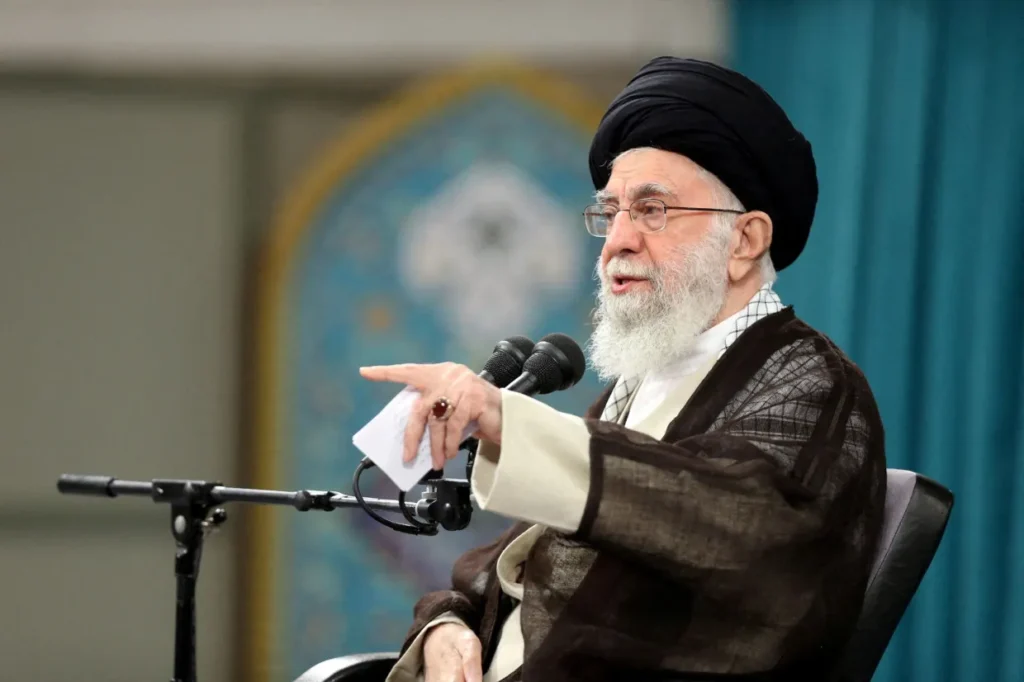WASHINGTON — President Donald Trump vetoed an Israeli proposal to assassinate Iran’s Supreme Leader Ayatollah Ali Khamenei, fearing such a strike would escalate into a broader regional conflict, a U.S. official familiar with the matter told The Associated Press.

According to the official, who spoke on condition of anonymity due to the sensitivity of the discussions, Israeli officials recently informed the Trump administration of a “credible plan” they had developed to eliminate Khamenei. But after reviewing the proposal, Trump opposed the move, citing concerns it would dangerously destabilize the region and undermine efforts to contain the conflict between Israel and Iran.
The official emphasized the administration’s concern that a targeted killing of Iran’s top leader could ignite full-scale war, derailing attempts to manage Israeli military operations aimed at crippling Tehran’s nuclear ambitions without widening the confrontation.
Israeli Prime Minister Benjamin Netanyahu, when asked about the plan during an interview with Fox News’ “Special Report with Bret Baier,” sidestepped the issue. “I think that we do what we need to do, we’ll do what we need to do,” Netanyahu said. “And I think the United States knows what is good for the United States.”
Later, Netanyahu spokesman Omer Dostri dismissed reports of an Israeli operation targeting Khamenei as “fake.” Still, Netanyahu suggested that regime change in Tehran “could certainly be the result” of the escalating hostilities, citing what he called the “weak” state of Iran’s ruling government.
Trump’s rejection of the Israeli plan was first reported by Reuters, and comes at a volatile moment in Middle Eastern geopolitics, as Israeli and Iranian forces have exchanged missile fire for three consecutive days. Although Iran has directly accused the U.S. of complicity in Israeli strikes, Trump publicly denied American involvement in an early Sunday post on social media.
“The United States had nothing to do with the attack on Iran,” Trump wrote. “If we are attacked in any way, shape or form by Iran, the full strength and might of the U.S. Armed Forces will come down on you at levels never seen before.”
Shortly afterward, Trump returned to social media with a more optimistic note, predicting that “Iran and Israel should make a deal, and will make a deal,” adding that an agreement could emerge “soon.”
Before departing for the Group of Seven summit in the Canadian Rockies on Sunday evening, Trump expressed hope for a diplomatic breakthrough while acknowledging the intensity of the conflict. “I hope there is going to be a deal, and we’ll see what happens,” he said. “But sometimes they have to fight it out.”
Trump suggested that his past success in de-escalating global crises — including mediating tensions between India and Pakistan following a deadly attack in Kashmir — demonstrated his ability to resolve conflicts. He reiterated his controversial claim that his intervention helped prompt a ceasefire between the nuclear-armed neighbors, despite pushback from Indian officials.
He also pointed to U.S.-brokered negotiations between Serbia and Kosovo and Egypt and Ethiopia during his first term as examples of his peacemaking record. “Likewise, we will have PEACE, soon, between Israel and Iran!” Trump posted. “Many calls and meetings now taking place. I do a lot, and never get credit for anything, but that’s OK, the PEOPLE understand. MAKE THE MIDDLE EAST GREAT AGAIN!”
Inside the Republican Party, Trump’s cautious approach has sparked debate among his allies. Prominent right-wing figures including Rep. Marjorie Taylor Greene of Georgia, Turning Point USA founder Charlie Kirk, and former Fox News host Tucker Carlson have warned against further U.S. involvement in foreign entanglements, arguing Trump’s base supports a more restrained foreign policy.
Sen. Rand Paul, R-Ky., praised Trump for resisting escalation, saying he hoped the president’s “instincts will prevail.” Speaking on NBC’s “Meet the Press,” Paul said a negotiated settlement may be elusive, warning of “more war and more carnage,” and adding that “it’s not the U.S.’s job to be involved in this war.”
In contrast, Sen. Lindsey Graham, R-S.C., urged Trump to pursue diplomatic options but said the U.S. must be ready to support Israel with full force if necessary. “If that means providing bombs, provide bombs,” Graham said on CBS’ “Face the Nation.” “If that means flying with Israel, fly with Israel.”
As global leaders gather for high-stakes talks in Canada, the Israeli-Iranian conflict is expected to dominate the agenda. Trump, seeking to showcase himself as a dealmaker on the world stage, remains determined to strike a balance between deterrence and diplomacy — even as his administration walks a tightrope amid one of the most dangerous flashpoints in the Middle East in years.



